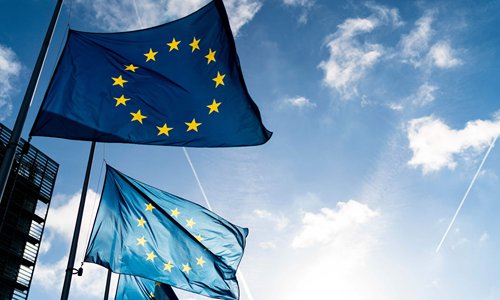Chinese experts warn EU's Magnitsky laws could 'target certain country'
By Liu Xin Source: Global Times Published: 2020/12/9 19:53:41
Chinese experts warn EU's Magnitsky laws could 'target certain country

EU flags Photo: VCG
As the EU reportedly plans to officially adopt its own Magnitsky laws on Thursday - World Human Rights Day on each December 10 - to target "human rights abusers," Chinese experts were concerned the legislation may be politicized and used as a tool to woo allies under the disguise of human rights in a so-called free and democratic world to contain and attack China.
EU foreign ministers on Monday approved the new mechanism that allows the bloc to impose sanctions on individuals and organizations perceived to be responsible for human rights abuses, including genocide, crimes against humanity, extrajudicial killings and arbitrary arrests.
The legislation, officially called the EU Human Rights Global Sanctions Regime, is similar to the US' Magnitsky Act. The UK and Canada also have their own versions of the "Magnitsky laws".
Chinese experts warned that it is possible that the new legislation may be used to target China on its Hong Kong Special Administrative Region and Xinjiang Uygur Autonomous Region, which would affect China-EU ties and cooperation on trade and other fields.
Bill Browder, who labeled him as "Head of the Global Magnitsky Justice campaign" on his Twitter account, was described by US media Politico as making efforts to persuade the EU to pass the legislation. The man was cited by Politico as saying that he hoped the Magnitsky mechanism could also be passed in Australia, and "the world's leading democracies" could join forces to impose sanctions on China over the "persecution" of Uygur Muslims.
Australia has been under fierce criticism for its soldiers' murder of innocent civilians in Afghanistan. In the wake of the "battle of words" between China's Foreign Ministry spokesperson Zhao Lijian and Australian Prime Minister Scott Morrison over the issue, more horrific and crude details of Australian soldiers in Afghanistan have been exposed.
The US' Magnitsky Act was initially introduced to target Russia, and then expanded as a tool to interfere with other countries' domestic affairs or pressure other counties. It has also been used by the US to sanction Chinese officials for issues related to Hong Kong and Xinjiang over groundless accusations.
"It is a wicked law," Jia Chunyang, an expert from the China Institutes of Contemporary International Relations, told the Global Times on Wednesday.
Analysts also noted that the US Magnitsky Law has created severe ideological conflict between the US and Russia and they warned EU should not follow the same old disastrous road.
Whether the EU's Magnitsky laws would be used as a political tool like the US to target a certain country, and whether it would adopt double standards on issues concerning human rights in developing and Western countries needs further observation, Zhu Ying, deputy director of the National Human Rights Education and Training Base of Southwest University of Political Science and Law, told the Global Times on Wednesday.
However, the EU is pushing the legislation on human rights at a time when Joe Biden has become the US president-elect, showing its efforts to strengthen transatlantic cooperation with the US to deal with China's rising influence, and help pave the way for the US to return to multilateralism on human rights, Zhu said.
Experts also pointed out that during the COVID-19 pandemic, due to issues on 5G, Huawei, anti-virus aid and the so-called China's wolf warrior diplomacy, suspicion and vigilance toward China have increased in some EU countries.
"Aside from coordinating with the US, the EU also wants to use the legislation to burnish the 'historic legacy' and make its own voice on human rights. Although the 27 members have their own considerations on investments or technology or trade from China, the EU wants to have one voice on human rights to unite the bloc," Zhu noted.
Jia said that if the EU follows the US on its Magnitsky laws to pressure China on baseless accusations, especially on matters related to China's core interests, it would be a blow to China-EU ties and would affect people exchanges, which is not good for the EU.
There is a trend that some Western countries are wooing more parties to join them to form a so-called free and democratic frontline against China especially on human rights issues. But they are actually losing the moral high ground as their attitude toward incidents like Australian soldiers' atrocities exposed their double standards and hypocrisy, experts said.
Analysts also warned that the EU should know that China would not tolerate long-arm jurisdiction and will take countermeasures when provoked.
Posted in: SOCIETY,CHINA FOCUS